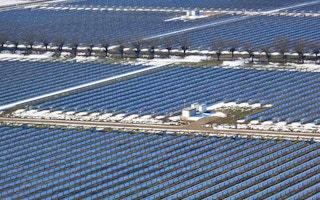Global investment in renewable energy, against expectation, now outstrips spending on fossil fuels.
Across the planet, economies have been either dependent on or addicted to fossil fuels for 150 years, but there appears to be global momentum towards better energy use and more sustainable approaches, according to a new study in Nature Energy journal.
Catherine Mitchell, professor of energy policy at the University of Exeter, UK, argues that change is on the way.
Not everybody shares her optimism. It isn’t clear that governments everywhere are acting on their own declared principles, and the argument still has to be won.
“
It has got to the point where more than half of global electricity system investment is in renewables, rather than fossil fuels investment
Catherine Mitchell, professor of energy policy at the University of Exeter
Reducing emissions
But there are clear signs of change, as demonstrated by the 195 governments that promised at the UN climate change summit in Paris last December to try to contain average global warming to around 1.5°C principally by reducing carbon dioxide emissions released in the combustion of fossil fuels.
Professor Mitchell says: “While the world is still dependent on fossil fuels, because energy systems have long lives, it has got to the point where more than half of global electricity system investment is in renewables, rather than fossil fuels investment.
“It is a sign that, globally, we have moved our public policy discourse and investor preferences from the old ‘dirty’ energy system to a clean one.”
She sees two changes that are fundamentally altering both practice and mindset.
One of these is the rapid uptake of what she calls variable power renewables – academic shorthand for wind and solar energy – within just a few countries or states. Denmark, Germany, Portugal, Spain, California and Hawaii all derive somewhere between 25 per cent and 43 per cent of their electricity from these sources.
The second change, which builds on the first, is a greater understanding of the value of flexibility for the secure operation of energy systems. This process began more than 40 years ago, during an energy crisis precipitated by some of the oil-producing states. There was every incentive at that time to diversify.
Fall in costs
But the increasing adoption of renewables has led to a fall in costs, which has in turn encouraged further investment.
A few nations, such as the UK, remain dominated by conventional energy systems, Professor Mitchell says, but most now support a move to a sustainable future.
“They are just trying to act as good global neighbours and have realised that meeting their climate change reduction commitments is no longer as expensive as they thought, and it helps, rather than makes worse, the security of their energy systems,” she says.
The recent UN agreement has led to strong support for the sustainable energy policies declared by individual nations. “However, these statements need to be backed up with appropriate governance – policies, institutions, incentives and energy system rules – to make sure they are implemented and successful,” Professor Mitchell stresses.

















